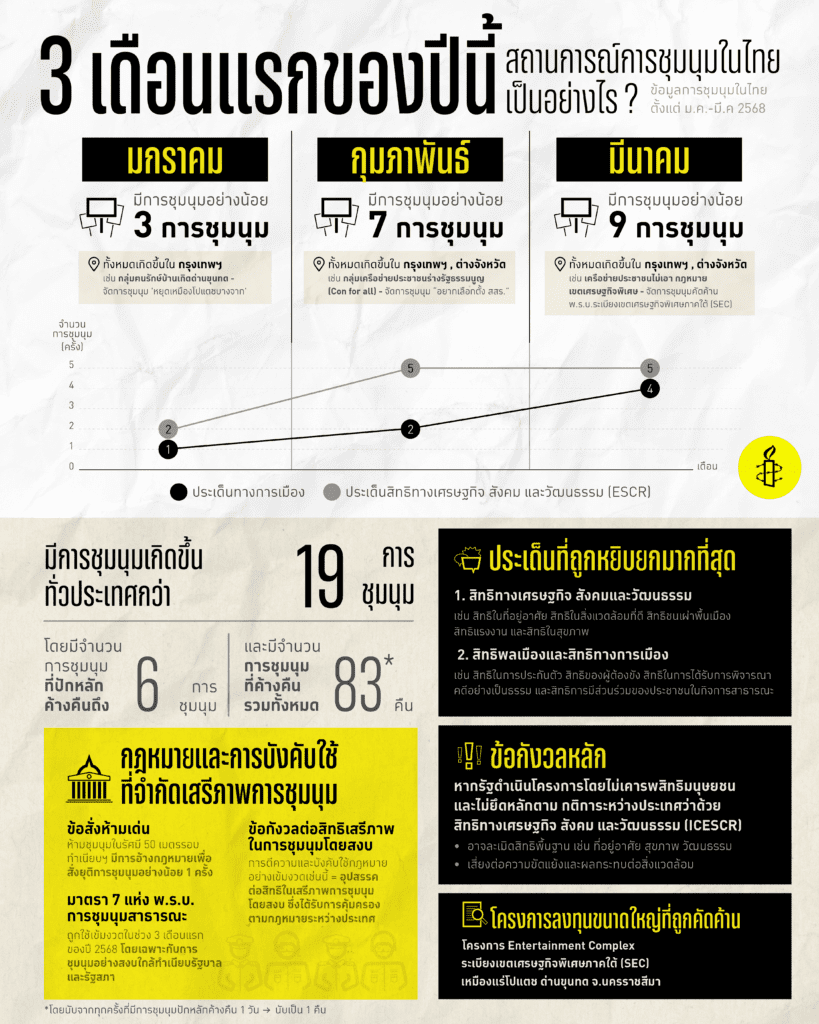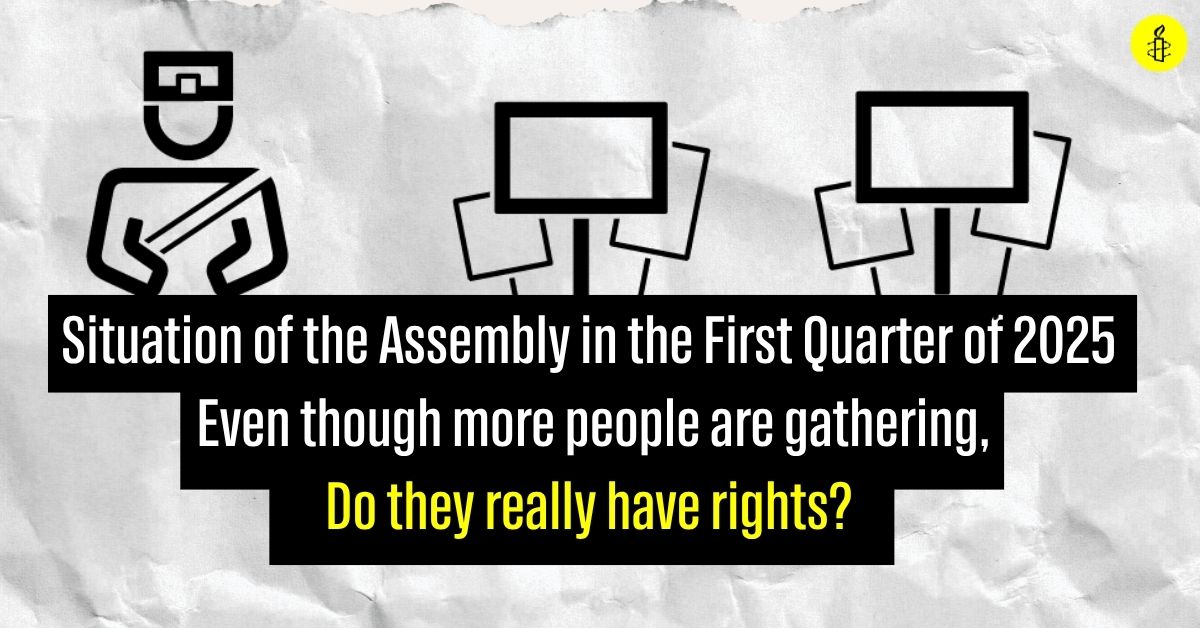Even though more people are gathering, Do they really have rights?
Throughout the first quarter of 2025 (January–March), public gatherings in Thailand continued to occur, although the number was significantly reduced compared to the same period last year. The political transition that many expected would lead to the opening of democratic space has not been reflected in the freedoms of assembly and expression. A total of 19 gatherings took place across the country, with most being small-scale. Out of these, 6 were overnight gatherings, and supposedly, one overnight gathering is counted as one. There will be a total of 83 gatherings nationwide, which is a high number considering the approximately 3-month period.
A total of 19 gatherings took place across the country, with most being small-scale. Of these, 6 were overnight gatherings. Suppose one overnight gathering is counted as one. In that case, there will be a total of 83 gatherings nationwide, which is a high number when compared to a period of approximately 3 months or 90 days.
In addition to the duration of the rallies, the number of rallies has also been increasing. In January, there were three rallies. In February, the number of rallies increased to seven, and in March, there were nine, totalling 16 rallies throughout the quarter. Out of these, only six rallies used public spaces in Bangkok, while the other 13 were scattered in various provinces.
The Most Demanded Issue
The main issue that was most demanded, the main topic of the 12 rallies, was Economic, Social and Cultural Rights (ESCR) because a large number of people continued to fight against the impacts of large-scale infrastructure development policies, land use problems, and the state’s resource management without any civil participation, such as land issues, environmental protection, occupations, and unfair land expropriation. The Entertainment Complex project and Southern Economic Corridor (SEC) was the two mega-project that received the most protests. The secondary topic was civil and political rights, including elections, the constitution, and the right to a fair justice process. The rallies, which should be a fundamental right of the people, to demand fairness in the justice process and question the state’s lack of transparency, continued despite facing legal limitations and strict control by the officials. The action by the authority has become a tool of the state to file charges against participants. For example, blowing trumpets to mourn, laying cloths with messages in front of the Constitutional Court, or even holding up handwritten signs became illegal, and the organisers were held liable, both civilly and criminally, as well as administratively.
The main topic of the 12 rallies was Economic, Social and Cultural Rights (ESCR)
Although 2025 began with hope, the voices of the people who gathered through the rallies have faded. The reason is not that the problems have disappeared but rather that the obstacles have increased. Some instances in question are the project in the Special Economic Zone (SEC), two of the projects that drew the most protests at the beginning of the year because it impacted local resources and was pushed forward without a genuine participatory process.
Another reason why the people’s right to assemble and make their voices heard in an environment where the law remains a tool to limit expression is not due to complacency but rather to fear and uncertainty about their fundamental rights.
The invocation of “security” without clear justification, as authorities often invoke security to restrict the use of public areas or issue orders prohibiting assembly after citizens have reported the assembly, even when there is no evidence of danger. These trends reflect the selective enforcement of the law, the excessive use of discretion that may lead to violations of citizens’ rights and freedoms, and the disregard for the principle that an assembly is presumed peaceful until proven otherwise. The broad interpretation of the law allows authorities to restrict citizens’ rights arbitrarily. The law itself and its enforcement are also obstacles, as the law continues to be used to obstruct the freedom of assembly, such as banning the use of public areas without necessary reason or the use of Section 7 of the Public Assembly Act of 2015, which strictly prohibits the use of Government House, the courts, and the Royal Palace for assembly, even in cases where the assembly is peaceful and does not obstruct the work of the state.

Mr. Faozee Lateh, Policy and Advocacy Officer at Amnesty Thailand, commented on the current protest situation, saying, “Although large-scale protests have not taken place, the number of protests clearly indicates that there are still many problems that the government has not resolved. Moreover, some problems are caused by government policies, such as the large-scale special economic zone development project, which has not been thoroughly assessed for its comprehensive impacts. Furthermore, it has exacerbated people’s suffering by blocking their ability to join groups, protest, and express themselves for the government to solve their problems.”
“Moreover, some problems are caused by government policies, such as the large-scale special economic zone development project, which has not been thoroughly assessed for its comprehensive impacts. Furthermore, it has exacerbated people’s suffering by blocking their ability to join groups, protest, and express themselves, for the government to solve their problems”
Mr. Faozee Lahteh, Policy and Advocacy Officer at Amnesty Thailand
If the government continues with large-scale projects without consulting communities and failing to protect people’s rights to assemble, we may see conflicts escalate. The right to assemble is an essential indicator of democracy. The more its voices are silenced, the more fragile the situation becomes, affecting people’s lives and livelihoods. The government can work on this issue immediately by promoting and not blocking freedom of expression and peaceful assembly, including reviewing and amending the Public Assembly Act to be in line with the International Covenant on Civil and Political Rights (ICCPR), which will create safe spaces for people to express themselves freely, especially regarding large-scale development projects that affect people’s lives.
Although the voices have faded, it is clear that “people have not stopped fighting.” Amnesty Thailand would urge the government to respect and protect the right to peaceful assembly under international standards, as this is one of the foundations of a just and open society. In an environment where the law is still a tool to limit expression, people’s voices have faded, not because of satisfaction but because of fear and uncertainty about their fundamental rights. If the Thai government fails to demonstrate a genuine intention to protect the freedom of assembly, it may lead to social instability and more severe conflicts in the future.
Read Full Report HERE


